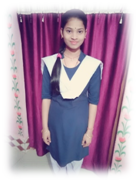Overcoming Caste Based Discrimination

Caste plays a complex stratifying role in our society and is still prevalent in rural areas. A key concern is that the processes that bring about these caste-based inequities begin early in a child’s life. Children from a young age get influenced with the discriminatory practices that they see at family and community level. Life skill education can be an effective tool to guide the young minds to exhibit respectful and non discriminatory behaviour to all.
The story of our life skill education trainee Adyasha Panda of Mudulgala village, Kakatpur, Puri district is evidence to this. Adyasha belongs to Brahmin community and her family is considered as higher caste people in the village. From her childhood Adyasha was influenced by her family that since she belongs to superior caste, she should always conduct herself in public and what she is expected to do at home and outside to uphold the honour and dignity of the caste. She should always maintain purity, should not go to the houses of her friends belonging to lower castes and should not take any food from them.
“I was even discouraged to attend the training classes with other girls initially by my mother.” Adyasha recalled. “But the training session on discrimination, power and inequality made me think on it. When we are not showing equal behaviour to others, we are violating the rights of that person. When we are born equal, why so much of differences among us?” She added.
“I have decided, I will hereafter do what all my friends are doing. I have understood there is no one superior by virtue of caste or religion. I will share my learning with my mother and my siblings that purity is something to be pure from inside by treating everyone equally.” Adyasha concluded.
